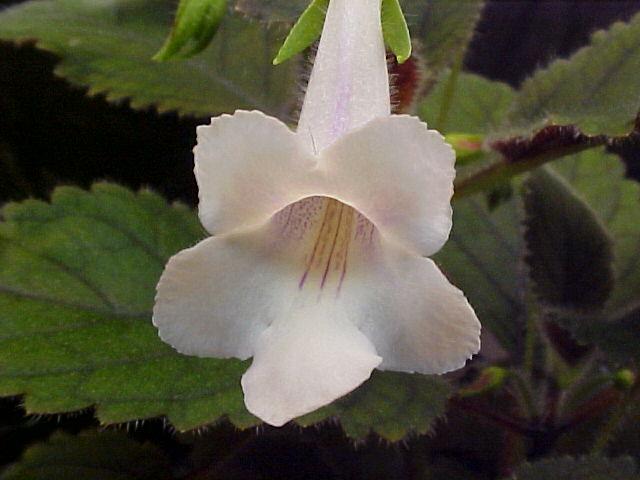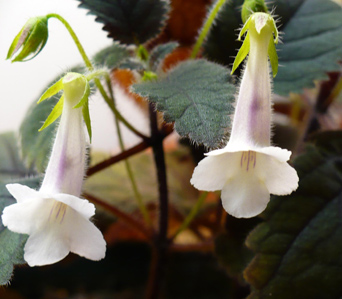Sinningia muscicola x conspicua

| Species list |
Hybrids list |
Tubers list |
Topics list |
Site index |
What's new |
Home page |
Sinningia muscicola x conspicua
|
|
Jim Steuerlein did this cross between a micro species Sinningia muscicola (formerly S. "Rio das Pedras") and a compact species with scented cream-colored flowers, namely Sinningia conspicua. Except as noted, the plants and photographs on this page are his. The above picture shows a closeup of the flower, which displays the markings I have come to expect of conspicua hybrids. These markings can be seen in the S. conspicua flower picture at the right. My crosses of S. conspicua with S. 'Peninsula Belle' have the same sort of markings in the throat even though the flowers themselves are quite different. With a length of about 3 cm, the flower of this cross is larger than that of S. muscicola, but smaller than that of S. conspicua (to the right, my picture of my plant). The scooped flower shape also shows a strong conspicua influence. |

|
|
|
|

|
The Whole PlantThis picture shows the whole plant, which is not a miniature as we might expect, but an upright grower with a definite stem and well-spaced internodes. The plant has a wiry reddish stem with prominent hairs. My plants of S. muscicola have slender, mostly green stems, while S. conspicua stems (and particularly the petioles) do show some red. |
|
|
|

|
Flowering patternThis picture shows that the plant has one flower per axil, a trait of both parents. This isn't a liability if the plant has lots of axils! Jim says he is going to name this hybrid "Toad Hall". |
|
|
|
| Plant Description |
|
| Growth | Indeterminate |
| Habit | Upright, with sturdy, thin, dark-red stem. |
| Leaves | Dark green, to 10 cm long. Reverse red. |
| Dormancy | Mine has not gone dormant yet. |
Flowering |
|
| Inflorescence | One flower per axil. |
| Season | Blooms intermittently |
| Flower | Lavender/white, tubular, with 60-degree bend in the middle. Corolla tube exterior has lavender tinge on outside top. Lower half of corolla tube interior has narrow purple stripes on yellow background. |
Horticultural aspects |
|
| Hardiness | No data yet, but not likely to be cold-tolerant. |
| Propagation | Cuttings only -- plant is sterile. |